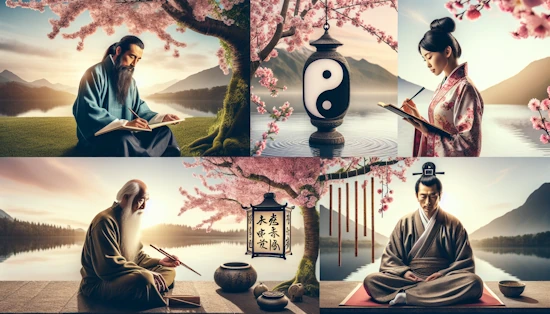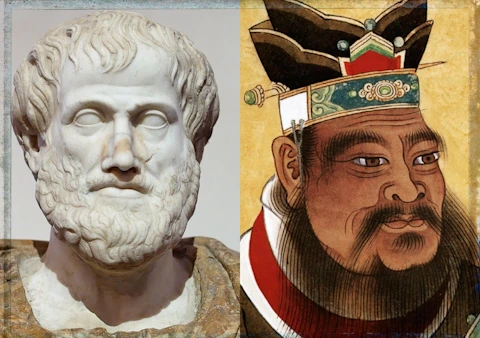
Eastern philosophy, with its diverse array of concepts such as karma, yin yang, and the pursuit of moksha, offers a multifaceted examination of life’s most profound inquiries. This school of thought, originating from the Eastern world, encompasses Chinese, Indian, and Japanese philosophies. Each of these philosophies contributes to the understanding of spiritual development, the interconnectedness of existence, and the importance of harmony in unique ways. The tenets of Taoism, which espouses the idea of living in accordance with the Tao, and Confucianism, which upholds personal and societal morality, have had a profound impact on cultural and intellectual discourse. Buddhism, another foundational element of Eastern thought, provides guidance to individuals on the path to enlightenment, offering a means of escaping the cyclical nature of rebirth through adherence to the dharma.
This article traverses the intellectual terrain of the Eastern philosophical landscape, examining the seminal thinkers such as Lao Tzu, Siddhartha Gautama, and the works they left behind, including the Tao Te Ching and the profound insights of Zen Buddhism. By examining the major themes addressed by these philosophies—including the ethical implications of Buddhist and Hindu philosophies and the strategic musings of Sun Tzu—we aim to provide readers with an accessible gateway into understanding how these age-old teachings continue to resonate and influence modern applications of Eastern wisdom. The article aims to demonstrate the value of engaging with Eastern philosophy through a comparison with Western philosophical thought. It seeks to illustrate the potential for dialogue and the capacity for bridging diverse perspectives, thereby fostering a deeper appreciation for the nuances of human inquiry.
The Foundations of Eastern Philosophies
Eastern philosophy, often referred to as Asian philosophy, encompasses a diverse range of thoughts and practices originating from various regions including East and South Asia. This broad category includes notable traditions from Chinese, Indian, Indonesian, Japanese, Korean, and Vietnamese philosophical schools, each presenting unique perspectives and teachings that have profoundly influenced both ancient and modern thought.
Indian Philosophical Traditions:
- Historical Roots: Indian philosophy boasts ancient origins, tracing back to the Indus Valley Civilization and flourishing during the Gupta Empire.
- Major Schools: The philosophical landscape in India is diverse, featuring six orthodox schools of Hindu philosophy—Sāmkhya, Yoga, Nyāya, Vaiśeṣika, Mīmāṃsā, and Vedānta—and several heterodox schools such as Buddhism, Jainism, and Cārvāka.
- Key Concepts: Central to Indian philosophy are the concepts of dharma (duty/ethics), artha (purpose), kama (desire), and moksha (liberation). These ideas underscore the intricate tapestry of spiritual and material life, advocating for a balanced existence and the pursuit of spiritual enlightenment.
Philosophical Schools Across Asia:
- Chinese Philosophy: Encompasses Confucianism, Taoism, Legalism, and Mohism, focusing on ethics, familial bonds, social harmony, and alignment with the Tao.
- Japanese Philosophy: Includes Shinto and Zen Buddhism, which emphasize the veneration of kami (spirits) and the practice of meditation.
- Korean and Vietnamese Philosophies: Largely influenced by Confucian and Buddhist teachings, these traditions stress ethical conduct and the importance of community and family.
Core Themes and Approaches:
- Holistic View: Many Eastern philosophies adopt a holistic approach, viewing the world as interconnected and emphasizing the balance between various elements of life.
- Time and Reality: Contrasting with Western linear time perception, Asian philosophies often perceive time as cyclical. They offer unique interpretations of reality, such as the non-dualistic Brahman in Advaita Vedanta and the illusory nature of existence (Maya) in Buddhism.
- Ethical and Social Dimensions: These philosophies integrate personal and social ethics, with systems like Confucianism detailing appropriate conduct across different social roles.
Eastern philosophy’s rich and varied traditions continue to offer profound insights into the ethical, social, and spiritual questions of human existence, promoting a deeper understanding of life’s interconnectedness and the pursuit of harmony and enlightenment.
Key Philosophers and Their Teachings
Lao Tzu and Taoism: Lao Tzu, a seminal figure in Chinese philosophy, authored the foundational text of Taoism, the “Tao Te Ching”, between the 6th and 4th centuries B.C. His teachings emphasize the Tao, or the way, as an essential, guiding force in the universe. Key principles include:
- Achieving harmony with nature rather than opposing it.
- Pursuing enlightenment by becoming one with the cosmos.
- Advocating simplicity and spontaneity in actions (wuwei), which aligns with natural order.
Siddhartha Gautama (Buddha): Living around the 6th or 5th century B.C., Buddha’s insights continue to influence millions worldwide. His doctrine revolves around:
- The Four Noble Truths, which outline the nature of suffering, its causes, and the path to its cessation.
- The concept of Nirvana, a state of ultimate peace and enlightenment pursued across numerous lifetimes.
- Emphasizing ethical living and mental discipline through practices like meditation.
Confucius and His Ideologies: Confucius, an ancient Chinese teacher and government official, contributed profoundly through works like the “Analects”. His philosophies focus on:
- Strong familial relationships and ancestor veneration.
- The concept of ‘Li’, which prescribes appropriate behaviors within societal roles.
- Promoting a humanistic approach that values the welfare of the community over individual desires.

These teachings from key philosophers not only provide a foundation for personal and societal ethics but also offer a comprehensive view into the spiritual dimensions influencing Eastern thought. Through their diverse approaches—from Taoist harmony with the natural world to Buddhist pursuit of spiritual liberation and Confucian social ethics—these philosophies invite a deeper understanding of life’s complexities.
Major Themes in Eastern Philosophies
Asian philosophies, encompassing schools of thought like Buddhism, Taoism, and Confucianism, delve into profound themes that contrast significantly with Western paradigms. These philosophies offer a unique perspective on existence, emphasizing holistic views and interconnectedness. Here are some of the major themes explored in Eastern philosophies:
Ultimate Reality and Enlightenment:
- Many Eastern teachings propose the concept of an ultimate reality or truth, which transcends human understanding. This is evident in the doctrines of Buddhism, Hinduism, and Taoism.
- Understanding the self as part of a larger whole is crucial. In these traditions, self-realization is not just about personal enlightenment but is interconnected with all existence, leading to a state of liberation.
Practical Pathways to Spiritual Liberation:
- Meditation and Yoga: Central practices in many Eastern traditions, these disciplines help individuals achieve a deeper connection with the self and the universe. Regular meditation, for instance, is not just a practice but a way to foster peace, enhance concentration, and deepen spiritual connection.
- Ethical Living: Emphasized across various philosophies, ethical conduct and morality play a significant role in achieving spiritual growth and enlightenment.
Philosophical Views on Time, Reality, and Existence:
- Cyclical Nature of Time: Unlike the linear time perception of the West, Eastern philosophies often view time as cyclical, which influences their understanding of life and the cosmos.
- Non-Dualism: This concept challenges Western dualism, suggesting a more fluid understanding of existence. Prominent thinkers like Nishida Kitaro and D.T. Suzuki have articulated these views, which contrast sharply with the often binary Western thought.
- Interconnectedness and Interdependence: A core belief in Eastern thought is that all elements of the universe are interconnected. This worldview fosters a deep appreciation for the natural world and emphasizes the balance necessary for health and well-being.
These themes not only enrich the philosophical discourse but also offer practical insights into leading a balanced and fulfilling life. By embracing these concepts, individuals can explore new dimensions of personal and collective existence, fostering a deeper understanding of themselves and the world around them.
Eastern vs. Western Philosophical Thought
The exploration of philosophical concepts across different cultures reveals profound distinctions and intriguing similarities between Eastern and Western thoughts. Here, we delve into the comparative analysis of these philosophical traditions, highlighting their unique perspectives on life, ethics, and the universe.
Divergence in Philosophical Foundations:
- Concept of Reality and Existence: In Western philosophy, the investigation into the nature of the world is prevalent, with a focus on existence, time, and motion, often backed by logical reasoning and mathematical analysis. Conversely, Eastern thought, particularly in traditions such as Buddhism and Taoism, often views reality as cyclical and interconnected, emphasizing a holistic approach to the cosmos.
- Individualism vs. Community: Western thought typically celebrates individual rights and personal freedoms, placing the individual at the center of philosophical discourse. Eastern philosophy, with its roots in teachings like Confucianism and Hinduism, often stresses social harmony and the collective over the individual, advocating for ethical conduct within a societal framework.

Philosophical Approaches to Life and Ethics:
- Action vs. Acceptance: Western philosophy generally encourages proactive change and overcoming obstacles through innovation and reform. This dynamic approach is reflected in the Western emphasis on technological advancement and social change. In contrast, Eastern philosophy often promotes acceptance of one’s circumstances, with a focus on achieving harmony and balance within the existing order, as seen in the Taoist concept of Wu Wei.
- Spiritual vs. Material Priorities: The spiritual undertones of Eastern philosophies like Hinduism and Taoism contrast with the more materialistic views often found in Western thought. While Eastern teachings delve into spiritual liberation and inner peace, Western philosophy tends to focus more on material success and empirical knowledge.
Influence and Integration in Modern Contexts:
- Health and Wellness: Eastern philosophies have profoundly influenced global wellness practices. Techniques such as yoga and meditation, rooted in Asian traditions, have been widely adopted in the West for their mental and physical health benefits.
- Ethical and Environmental Considerations: The ethical teachings of Eastern philosophies, such as the emphasis on social harmony in Confucianism and the environmental alignment in Taoism, offer valuable insights for contemporary issues in governance, business ethics, and environmental sustainability.
This comparative analysis not only highlights the distinctive attributes of Eastern and Western philosophical thought but also underscores the potential for integrative dialogue that respects and learns from both traditions. By examining these differences and intersections, we can foster a more inclusive and holistic understanding of philosophical inquiry.
Modern Applications of Eastern Philosophies
Eastern philosophies have found various modern applications that significantly impact today’s global culture, health practices, and educational methodologies. Their integration into Western contexts illustrates a successful cross-cultural exchange and adaptation. Here are some key areas where Eastern philosophical practices have been effectively applied:
Health and Wellness:
- Meditation and Yoga: These practices, central to many Eastern traditions, have been widely adopted in the West for their health benefits. Meditation improves focus, reduces stress, and enhances emotional regulation. Yoga combines physical postures, breathing exercises, and meditation to promote physical and mental well-being.
- Mindfulness-Based Stress Reduction (MBSR): Developed from Buddhist meditation principles, MBSR is utilized in numerous medical settings to help alleviate stress, anxiety, and depression, demonstrating the practical health applications of Eastern mindfulness practices.
Education and Personal Development:
- Mindfulness in Education: Eastern philosophies emphasize the importance of mental discipline and self-reflection. Programs based on these principles, like mindfulness-based learning, are increasingly incorporated into educational curriculums to aid in improving students’ concentration, emotional regulation, and overall academic performance.
- Leadership and Management: The principles of Zen Buddhism and Taoism are being integrated into Western business practices. For example, the emphasis on balance and ethical considerations in leadership styles promotes more empathetic and effective management approaches.
Sustainable Practices and Architecture:
- Permaculture and Sustainable Design: Taoist concepts of living in harmony with nature influence modern sustainable living practices. This includes the design of permaculture gardens, which utilize the principles of interdependence and cyclical resource use.
- Eco-Friendly Architecture: Influenced by the balance of yin and yang, architects are increasingly turning to Eastern philosophies to create buildings that harmonize with their natural surroundings, promoting sustainability.
These applications not only demonstrate the versatility and relevance of Eastern philosophies in modern contexts but also highlight the ongoing dialogue between Eastern and Western thought, fostering a richer, more inclusive global culture.
Challenges and Criticisms
While Eastern philosophies offer profound insights and have been integrated into various modern practices, they are not without their challenges and criticisms. These critiques often stem from cultural, logical, and philosophical differences with Western thought.
Contradictions with Western Worldviews:
- Some researchers note contradictions between Eastern religious concepts and the Judeo-Christian worldview, particularly the idea of the soul as the unmoved mover and the application of many-valued logic. Such differences can lead to misunderstandings and skepticism among those accustomed to monotheistic and binary logic frameworks.
- Dr. Craig argues against the Eastern denial of a substantial soul or enduring self, finding the notion of an indescribable and distinction-less Absolute implausible. He challenges the view of one’s self as divine, citing human finitude and imperfections.
Philosophical and Logical Inconsistencies:
- The application of many-valued logics in both Eastern philosophy and quantum physics, as questioned by Dr. Craig, contradicts the traditional law of non-contradiction fundamental to Western logic. This approach can seem illogical and self-refuting to those who prioritize strict logical consistency.
- Eastern philosophies often eschew traditional logical frameworks when discussing ultimate reality, which can be perceived as intellectually incoherent to those trained in Western philosophical traditions.
Perceptions and Misinterpretations:
- Robert Ellis critiques the portrayal of Eastern philosophy in Western introductions, noting a tendency to either dismiss these philosophies as mere “navel-gazing” or to naively integrate them into Western lifestyles without full comprehension.
- The broad and sometimes exotic label of “Eastern” philosophy may obscure its universal relevance, leading to both underestimation and oversimplification of its doctrines and practices. Ellis also points out inaccuracies in some Western interpretations, which can mislead newcomers and hinder genuine understanding.
These points highlight the necessity for a more nuanced engagement with Eastern philosophies, advocating for a balance of openness and critical scrutiny to foster a more accurate and respectful cross-cultural philosophical dialogue.
Conclusion
By investigating Asian philosophical traditions, we have gained insight into the teachings and legacies of seminal thinkers, offering new perspectives on life’s most profound questions. The insights of Lao Tzu, Siddhartha Gautama, and Confucius, among others, have illuminated the paths to understanding spiritual development, ethical living, and the essence of interconnected existence. These doctrines, advocating for harmony, enlightenment, and social responsibility, offer rich conceptual frameworks that continue to influence contemporary discourse, integrating seamlessly with modern practices in health, education, and sustainability.
A comparative analysis of Eastern and Western thought has revealed not only their philosophical divergences but also potential areas of convergence, fostering a dialogue that enriches our global cultural landscape. As these ancient teachings are applied in the contemporary world, from mindfulness in classrooms to ethical leadership in business, they demonstrate the enduring relevance and transformative potential of Eastern philosophies. Adherence to these tenets engenders a more comprehensive and equilibrium-oriented approach to the intricacies of contemporary existence, facilitating a deeper comprehension and concord among individuals and communities.
Do you consider yourself an enlightened person? Then you should try our personality tests, created especially for people like you who seek a deeper meaning in their existence.
TAKE THE AWARENESS TEST
TAKE THE AWAKENING TEST
TAKE THE GREAT PERSONALITY TEST
MINI SELF-EVALUATION TEST: ARE YOU A SPIRITUAL PERSON?
Read the sentences below and select the ones you agree with and that you think make the most sense.
Count the number of boxes checked and read the corresponding profile.
0: You are not spiritual at all
1-2: You are hardly spiritual
3-4: You are quite spiritual
5-6: You are very spiritual
MINI SELF-ASSESSMENT TEST: ARE YOU A TRUE BUDDHIST?
Select the sentences that you consider in line with the Buddhist view of life.
Record the number of checked boxes and see the relevant profile.
0: You are not Buddhist at all
1-2: You are vaguely Buddhist
3-4: There is a growing Buddha in you
5-6: You are Siddhartha Gautama himself!
